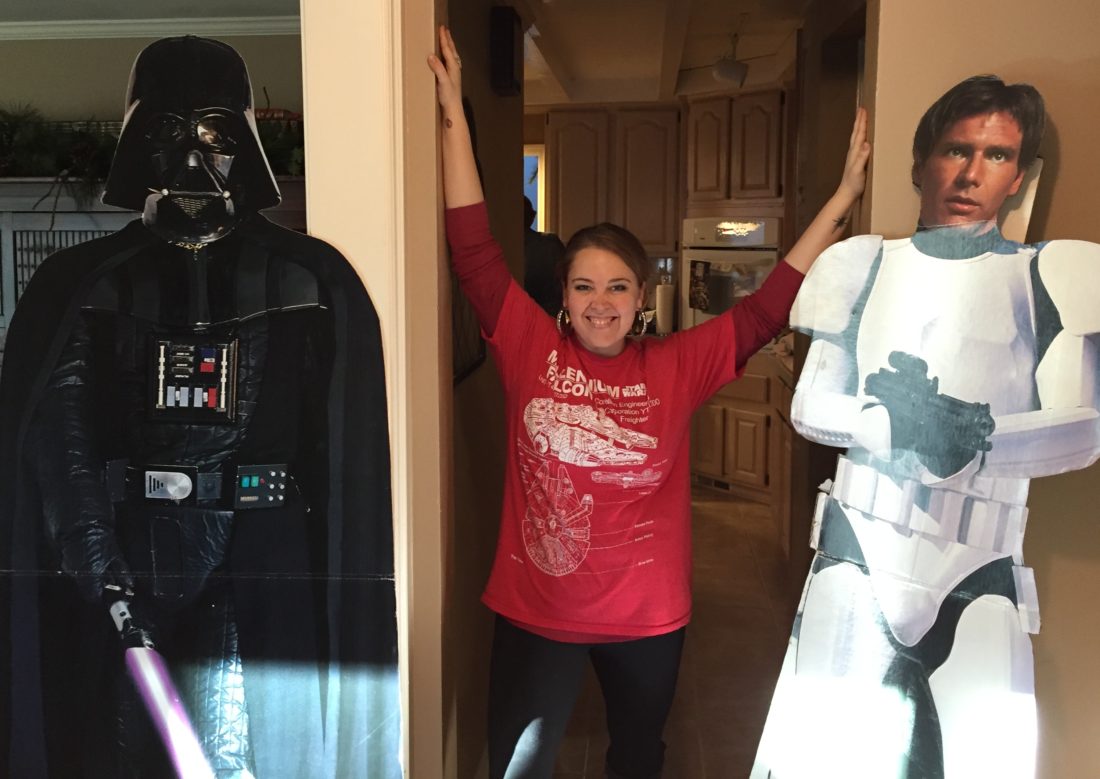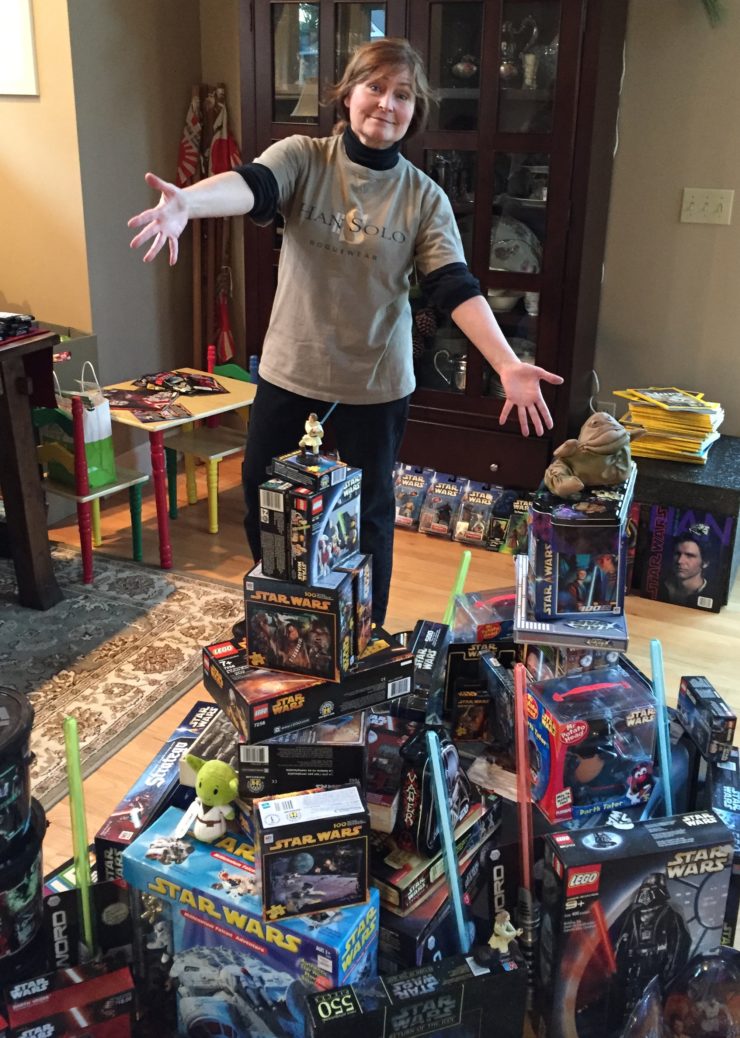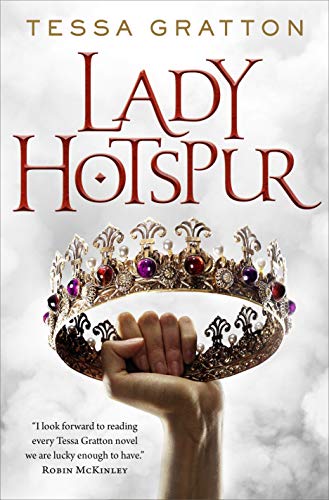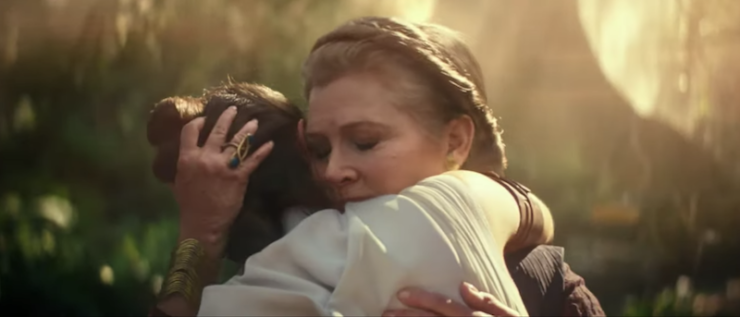“Just get me to December 2019,” Mom told her oncologist on what would end up being her last appointment. She’d just finished a procedure to drain fluid from her chest that had caused her lung to partially collapse, and her doctor had asked if there was anything she could do for Mom.
At the answer, the doctor tilted her head, confused and unsure if Mom, whose sense of humor had not lessened over the course of eighteen months of mostly experimental treatments, was making a joke.
But I understood. Perched on the stool in the corner, with the cancer notebook on my lap for taking notes about medications or new drugs or treatment schedules, I stopped breathing. I lifted my eyes to see Mom’s bitter attempt at a cheerful smile. She didn’t have that long, and everybody in the room knew it.
“That’s when the next Star Wars movie comes out,” I explained, trying to sound lighthearted. The doctor laughed belatedly.
“I have to know what happens,” Mom said, laughing, too.
She died about two weeks later, on October 10th, 2018. And I didn’t think about Star Wars again for a while.
When the first trailer for The Force Awakens dropped, I, along with most of the internet, was thrilled. It was everything I wanted, especially the stunning visuals of ruined star destroyers and the flash of the Millennium Falcon. At my parents’ house, my youngest brother and I excitedly started playing it again, and Mom closed her eyes, sticking her fingers in her ears. She didn’t want to see or hear anything that would spoil the moment in the theater when the blasting music and prologue crawl began. Her experience of it would be as pure as possible. That’s the kind of fan she was.
While she loved books, she never read any of the Star Wars novels, no matter how many times I told her as a teen but Thrawn is an even better bad guy than Vader, or insisted that she’d love reading about Leia actively working with the force, she resisted. The movies were perfect unto themselves, she said, and exactly what she needed them to be. But if I wanted to tell her the stories myself, she’d love to listen.
Watching The Return of the Jedi is one of my earliest memories. We were stationed in southern California at the time, and went to the drive-in occasionally. My brother was two and I was four, and we’d make a blanket fort in the back of the van to play while Mom and Dad enjoyed their movie. Jedi was the first time I abandoned Sean, crawling up to crouch between the front seats because I could not stop staring at the little fighting teddy bears.
Ewoks were my first fan obsession. I wanted Ewok pajamas and Ewok shoes and Ewok cups and Ewok books, and I’m told for several months I stopped answering to “Tess” and insisted upon being called only “Wicket.” Mom didn’t seem to mind, though she preferred Wookiees to Ewoks, herself.
Eventually I transferred my loyalty from Wicket to his obvious BFF Princess Leia, and though I hate to admit it, my loyalty was bought for no more than the price of how beautiful her hair was in that movie. I coveted her long, loose waves, the braided crown, eventually the loops she wears at Cloud City, and even admired the buns. Nobody really wants to wear the buns, but you have to admit it takes a great head of hair to pull that off. I swore to myself, around age eight, that someday I’d have hair as long and luxurious as Leia’s, and learn how to braid it in a crown that could fit under a speeder helmet.
It was the first real goal I ever made for myself, and I stuck to it until in high school I achieved a length long enough I sat on it, closed it in the car door, choked on it at night, and was otherwise extremely annoyed by it. My arms got strong from being lifted over my head all the time as I practiced the crown of braids, fishtail braids, upside down braids, and realized the buns are impossible without foundational architecture helping them out.
Once Princess Leia hair had been achieved and maintained for several months, I chopped it all off in favor of a variety of jagged pixie cuts or asymmetry.
When Carrie Fisher suddenly died, I’d been wearing my hair around my shoulders, re-discovering how to braid it in half-crowns at the nape of my neck. At the news I panicked, made an emergency appointment at Beauty Brands, and two hours later it was all gone.
Then I went to my mom’s house, told her what had happened, and started crying in her kitchen. Mom was distraught: she and Carrie Fisher were the same age and it was way too young to die. Three months later, Mom was diagnosed with Stage IV uveal melanoma.

I grew up thinking it was normal to watch a Star Wars movie once a month on Sunday night, or to marathon the whole trilogy on a tiny TV Velcroed to the cooler as we drove to Yellowstone National Park for a camping trip. I thought it was normal for your mom to say “I love you,” and your dad to reply, “I know.” The first real conversation I had with the girl I’d someday marry started out in the back of another family van: she climbed in and asked me what I was reading. I showed her the cover of Children of the Jedi by Barbara Hambly, and her eyes lit up. For my high school graduation party, Mom and I designed a Star Wars theme, serving fried Bantha and Yoda Soda, a variety of veggies from Dagobah, and I’m sorry we didn’t know about porgs yet in 1999, or there would’ve been a platter of them. We made placards and got a cardboard cut-out of Han Solo, and had a great time. I’m pretty sure Mom and I enjoyed prepping for the party significantly more than we enjoyed the party itself.
It wasn’t the only Star Wars themed party my family ever threw either: we did it for Episode One, and again for The Force Awakens. We had a smaller watch party for Rogue One, and thank god it was small because I didn’t need more people witnessing my post-movie emotional breakdown. Mom was there to walk me through it, though, analyzing what I had and hadn’t liked, what had and hadn’t worked for me, until I could think about that movie without losing it.
She liked the Solo movie just fine, but would have rather just rewatched Empire. Anytime you liked she’d argue that Star Tours is objectively the best Disney ride, even after it was just as objectively no longer true.
We got into a fight about The Last Jedi, and I think in retrospect she didn’t love it because it hurt her too much to see Leia and Han and Luke torn apart. They’d been hers, her rebels, her peers who fought and loved and won, and seeing them broken, seeing their failures, made her look at what she’d done and not done with her life and wonder if when she was gone it would all fall apart, too.
I couldn’t manage to explain to her what I loved about the movie, other than how handsome Poe Dameron is and the film’s dramatic understanding of the rippling effects of brutal galactic war, depression, and found family. But I wish I’d thought to tell Mom in time that I think I really love Poe so much because his relationship with Leia reminds me of my relationship with her.

One of the last things Mom said to me was that she was afraid of how she’d be remembered, or not be remembered at all. She had a fraught relationship with her mother, who also had one with hers, and Mom was worried about me. I tell stories all the time, so what kind of stories would I tell about her? I promised her that my stories would be good ones, because she was the best person I’ve ever known. But good people never believe that of themselves.
My next book, Lady Hotspur, is dedicated to my mom, because it’s a book about making space for good when you try to rebuild the world. Mom was the kind of person who tried to fix everything. She’d join a group—PTA, book clubs, the parish sacristans, or Ikebana International—and two weeks later you’d realize she was already in charge of it. And she always made it better. She made the people around her better. But in Lady Hotspur the main mother-daughter relationship is a fraught one. Mom and I argued viciously when I was in college and grad school, because as I learned about power structures, politics, and feminism I was determined to burn down everything around me. It seemed like the only way to fight against a terrible, oppressive country built from the ground up to hurt people was with fire. I was trying to figure out how to be good, be powerful, how to create things that made the world better, like Mom did, but I couldn’t do it her way. I wanted to get in my spaceship and blow things up. She wanted me to be less selfish. These years were also the Prequel Trilogy Era, and after The Phantom Menace I don’t really remember Attack of the Clones and Revenge of the Sith. They’re the only Star Wars media I haven’t consumed again and again and again. Maybe because I was in a bad place, maybe because I could only see what was problematic about them, or maybe just because I didn’t share them at all with my mom. We didn’t share anything during those years, so it was impossible for me to like those movies.
I don’t know how to think about The Rise of Skywalker without her.
We keep knocking around the idea, my immediate family and I, about getting a group together to go see Episode 9, The Rise of Skywalker. I bring it up, or Dad does, or my little brother. We all act like, sure no big deal, let’s do it, and then nobody follows up. Nobody actually takes the steps necessary to make it happen.
None of us have tickets yet.
I know I have to go, but I don’t know how to make it happen.
Buy the Book


Lady Hotspur
Many people going to see The Rise of Skywalker will be sad, too, because we lost Carrie Fisher in between the movies. Because it was supposed to be Leia’s movie, because we’ll never know what could have been. Mom would not be proud of me for the selfish comfort I take in knowing I won’t be the only one feeling the ache of loss, the missing family. I won’t be alone in my grief.
Whatever else, Star Wars is always a collective experience.
To me, Star Wars is about doing the right thing. It’s about pulling rebels together, and choosing hope in a time of darkness. Whatever grief we feel about Carrie Fisher, we’ll be feeling together. Whatever trepidation we feel about the last generation of galactic heroes making way for our new heroes, whatever exhilaration and joy and fear we experience at the story, whatever love or hate we have for the characters who fight at all costs, who love and lose, who choose each other and maybe whatever redemption is achievable in a complicated universe where everybody makes hard calls and mistakes, we’ll be feeling it together.
Choosing to feel hope, choosing to embrace this story.
Mom wanted me to remember her well, remember her stories, remember who she was and how hard she worked to make the world better from her corner of it.
Being gone, never making it to Episode 9, that’s part of Mom’s story, too. I wish I believed in force ghosts, or any kind of ghosts, to imagine Mom in the theater with me—with all of us—and more importantly, there to argue about interpretation and character arcs and plot holes afterward. There to smile meaningfully at me, because she’s proud I was brave enough to go, brave enough to keep loving the stories that we shared now that I have to do it without her.
I hope I’ll see you all there.










